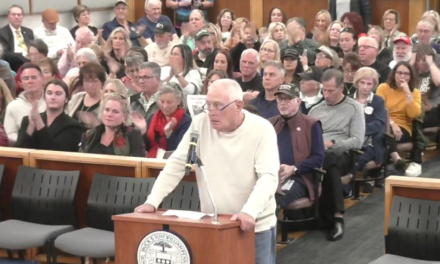We support our Publishers and Content Creators. You can view this story on their website by CLICKING HERE.
A foreign billionaire funneled hundreds of millions of dollars to a leftist dark money donor behind Ohio ballot measure Issue 1 — a redistricting initiative that could give Democrats a permanent advantage in Ohio. The state enacted a ban on foreign funding of such initiatives earlier this year.
Ohio residents will vote in November on Issue 1, which would establish a commission of “non-politician” appointees to redraw district lines, according to Ballotpedia. The commission would consist of five Republican members, five Democrat members, and five independent or otherwise affiliated members.
The primary group behind Issue 1 — Citizens Not Politicians — has taken funding from the Sixteen Thirty Fund, a branch of leftist dark money giant Arabella Advisors, financial records show. According to a watchdog report, the group has received hundreds of millions in funding from Swiss billionaire Hansjörg Wyss.
Republicans and election integrity advocates have raised concerns about the initiative, arguing it could essentially result in redistricting that largely favors Democrats, possibly helping the party gain control of Congress.
“What they’re after is the ultimate prize of flipping three to four congressional seats in the state of Ohio,” Republican state Sen. Rob McColley told The Federalist.“That would potentially be the difference between the control of the United States House of Representatives being Republican or Democrat.”
Honest Elections Project Executive Director Jason Snead echoed these concerns, equating the initiative to “a power grab by the left” that’s “designed to do an end run around the democratic process in Ohio.”
“It’s all designed to be entirely insulated from political accountability and, basically, from public opinion,” Snead told The Federalist. “It could wind up getting enough new Democrats elected in Ohio that this could decide which party controls Congress in 2026.”
Dark Money From Overseas
Wyss — who some conservatives have termed the “New Soros” — has given at least $243 million to the Sixteen Thirty Fund “since its inception,” according to an October 2024 report from watchdog Americans for Public Trust (APT). The Sixteen Thirty Fund, according to the report, “takes advantage of foreign influence loopholes” to, among other things, “bankroll efforts to elevate the Biden-Harris agenda,” “invest in massive voter turnout operations,” and “support ballot issue campaigns.” In Ohio alone, the Sixteen Thirty Fund spent close to $15 million to affect the state’s policies, according to the report.
APT Executive Director Caitlin Sutherland told The Federalist that from October 2023 to June 2024, the Sixteen Thirty Fund had given close to $7 million to Citizens Not Politicians.
“They’re the group’s number one donor,” Sutherland said.
Although federal law bans foreign contributions to elections, the Federal Elections Committee has held that this ban does not include contributions to ballot measure campaigns, as noted by Ballotpedia. Ohio closed this loophole earlier this year by banning foreign funding of ballot initiatives.
As APT reported this summer, Citizens Not Politicians received $6 million from the Sixteen Thirty Fund the same day Republican Gov. Mike DeWine called a special session to pass the ban. According to Sutherland, this was the “biggest cash infusion” from the leftist dark money group to Citizens Not Politicians.
“We became aware of the Sixteen Thirty Fund’s involvement through the campaign finance disclosures,” said McColley, who introduced a similar ban on foreign funding for ballot measures. “After doing some research, we realized pretty quickly that the Sixteen Thirty Fund’s primary funder is Swiss billionaire Hansjörg Wyss. It immediately caused us to ask the question, ‘How is this permitted?’”
McColley said the effort faced “more opposition than we anticipated” in the state House. Still, HB 1 passed on mostly partisan lines, and Gov. DeWine signed the ban into law in June.
A subsequent lawsuit brought in part by the Elias Law Group — the firm headed by infamous Trump-Russia hoax peddler Marc Elias — claimed that the restriction imposed on free speech, as The Associated Press previously reported. The case is still in progress, but earlier this month, a judge allowed Ohio to enforce the law in time for the 2024 election.
Citizens Not Politicians paid Elias’ firm nearly $70,000 for “legal services” between October 2023 and June 2024, according to records from Ohio’s campaign finance database. It paid the firm $7,500 just days before the special session.
Payments from Citizens Not Politicians to Elias Law Group.
Image CreditCourtesy Ohio Secretary of State
The group’s campaign filing from July shows a “balance on hand” of zero dollars and total expenditures of more than $24.8 million. Its most recent filing from Oct. 24 indicates this balance is still zero.

Citizens Not Politicians’ July campaign finance statement.
Image CreditCourtesy Ohio Secretary of State
The group is reportedly running millions of dollars worth of ads ahead of the election promoting the redistricting change.
“It’s a bunch of pre-booked ads paid for with this foreign-backed cash, which by the way is now illegal in Ohio, blanketing the airwaves,” Sutherland said.
The Honest Elections Project and APT recently announced their partnership to launch a six-figure digital ad campaign “exposing foreign-funding of Issue 1 in Ohio.”
The Sixteen Thirty Fund stopped funding Citizens Not Politicians after the state’s foreign funding ban took effect, APT posted on X on Friday, citing recent documents. “This is even more evidence that Sixteen Thirty Fund is a conduit for foreign money.”
Rigging The Electorate
Citizens Not Politicians claims passing Issue 1 would “ban politicians from gerrymandering” —or the “rigging voting districts” — by “putting citizens in charge” of redistricting.
In reality, such a model would enable a bureaucratically appointed commission to draw districts with the intention of making them lean either Republican or Democrat so that the proportion of districts controlled by each party matches the political leanings of the state’s overall population.
For example, Snead said if the statewide population breaks down to 53 percent Republicans versus 43 percent Democrats, the commission would be designed to ensure “the state will elect 53 percent of its representatives as Republicans and 47 percent as Democrats.”
The Ohio measure would eliminate the current requirement that “state legislative and congressional districts” be “compact.” Instead, as both Snead and McColley explained, the proposed amendment would allow the division of left-wing cities into different districts where their population can overwhelm rural conservatives.
McColley said the measure would “put gerrymandering into [Ohio’s] Constitution” by “drawing districts solely to favor one party over the other” and “splitting up political subdivisions solely for political advantage.”
“Those blue islands will be cracked up into as many districts as possible to maximize the number of Democrat districts,” McColley said.
In 2021, state Democrats adopted a similar strategy when redrawing district lines in Oregon. They divided the Portland Metro Area into four different districts (instead of the previous three), turning many of the state’s rural Republican areas into majority-Democrat districts.
Ohio already has a redistricting commission, including the governor, secretary of state, auditor, and appointees chosen by state Senate and House leaders. The new commission — funded by taxpayers — would appoint members from a pool of “applicants” through a screening process overseen by retired partisan judges, according to the initiative’s text.
The initiative would “require the commission to immediately create new legislative and congressional districts in 2025 to replace the most recent districts,” so the measure could drastically reshape Ohio’s political geography as soon as next year.
“You’re going to see the changes go into effect almost immediately, where communities will be needlessly split up for political advantage,” McColley said. “Anti-gerrymandering provisions that are in our current constitution will be completely subrogated to the thought that each district shall be drawn for the political advantage of one party over the other.”
Leftist groups successfully codified abortion as a right in Ohio’s constitution last year, as The Federalist previously reported. Democrats are expanding ballot measure efforts nationwide, pushing abortion, marijuana, mail-in voting, and ranked-choice voting.
Snead said left-wing dark money groups are backing these efforts in strategic areas.
“We’ve seen this explosion in the use of citizen initiative processes across the country to push progressive agendas,” he said. “They write these measures to accomplish 110 percent of what they could ever dream of.”
Sutherland said the Sixteen Thirty Fund is heavily investing in states that are “competitive battleground presidential states, or a competitive U.S. Senate race, or both.”
For more election news and updates, visit electionbriefing.com.
Logan Washburn is a staff writer covering election integrity. He graduated from Hillsdale College, served as Christopher Rufo’s editorial assistant, and has bylines in The Wall Street Journal, The Tennessean, and The Daily Caller. Logan is originally from Central Oregon but now lives in rural Michigan.

 Conservative
Conservative  Search
Search Trending
Trending Current News
Current News 





